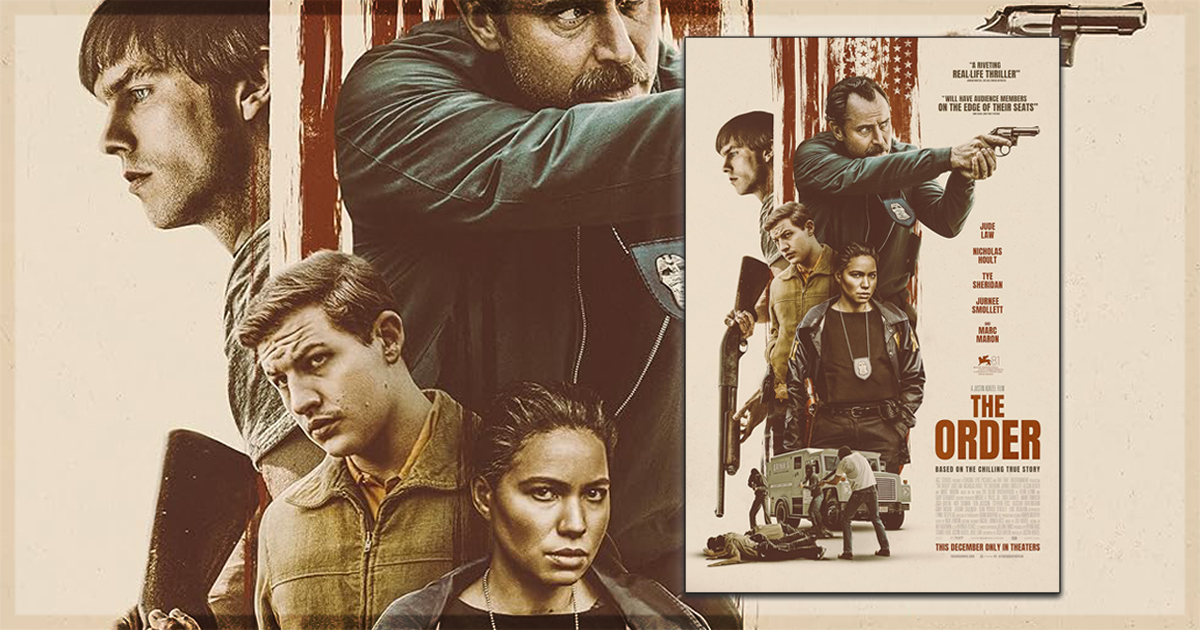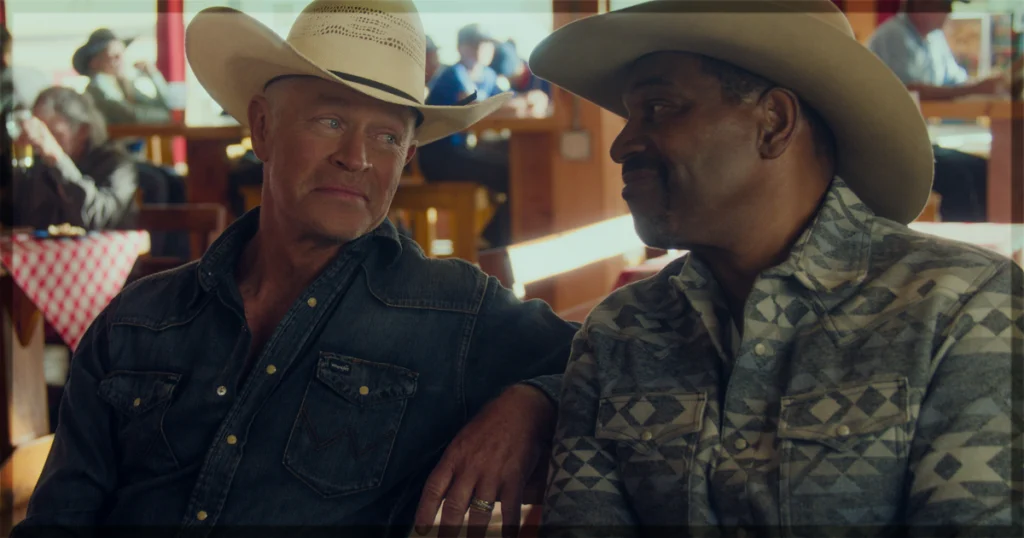Nicholas Hoult had a theme in 2024. The Order, director Justin Kurzel’s latest dramatic feature based on true events, puts his character in a very similar situation as in Clint Eastwood’s Juror #2. Both Bob Mathews (The Order) and Justin Kemp (Juror #2) are morally compromised men making bad (desperate, illegal, or just stupid) decisions in support of their pregnant partners and future children. Hoult brings his trademark sensitivity to both portrayals, pulling out the contradictions and complications – and boundless sympathy – for two questionably likeable characters without ever obfuscating their worst qualities and decisions. But this is where the similarities end.
While Justin may have committed vehicular manslaughter on a night of grief and must then debate whether to turn himself in, Mathews is an out-and-out white supremacist spearheading an extremist sect – The Order, also known as the Silent Brotherhood – in the woods of the Pacific Northwest. Furthermore, his partner is not his wife; it is another member of the Order sympathetic to his worldview of bolstering white births because his wife is infertile. With people like Elon Musk going on about falling birthrates and the need to have more children to “save” the white race (gross), seeing this story play out in 1984 shows the roots of current social ills are pervasive and deep.
But Hoult’s excellent performance in The Order is matched by Jude Law as Terry Husk, a fictional FBI agent based on Wayne Manis. Husk moves to Couer d’Alene, Idaho, to reopen a long-vacant field office and seek some lesser evils than fighting the Ku Klux Klan and Cosa Nostra. The Order, of course, puts a damper on his plans for lighter caseloads and weekends fishing in the mountain streams, and he follows the trail of bank robberies, kidnappings, and stockpiled weapons and ammunition across state lines to Oregon and Washington. Sporting a terrific moustache, Law is every inch the grizzled veteran still in his fighting prime, not willing to underestimate his enemy but only slowly understanding the full scope of this homegrown neo-Nazi menace. (The accent work from two British actors playing American, directed by the Australian Kurzel, is very strong.)
The Order splits its time between Mathews’ and Husk’s perspectives and knowledge of events, meaning that the audience sometimes pieces together motivations and perpetrators before either party fully knows what is going on. The procedural unfolding to the inevitable bloody showdown is pacy, thrilling, and unrelenting; in the best way, it feels like a throwback to the crime films of the 1980s while vividly bringing that era to life.
Kurzel has become something of a chronicler of toxic masculinity. From 2011’s Snowtown that chronicles infamous serial killings, to 2015’s taciturn take on Shakespeare’s Macbeth, to 2019’s True History of the Kelly Gang rewriting the legend of an Australian outlaw, to 2021’s Nitram lightly fictionalising the life of Australia’s last mass shooter, Kurzel is unflinching in his investigation of the violence men inflict upon one another and their own psyches. While Nitram in particular drew concerned press around the possibility of glorifying violence (to note, that film does not portray the crime it builds to), Kurzel does not glamorise his antiheroes, their circumstances, or their actions. The violence he films is often abrupt, brutal, loud, and supremely uncomfortable. Between these, he builds moments of menace where the potential for bloodshed lurks just below the surface. The best films in Kurzel’s oeuvre are somehow historical (even if that history is by way of Shakespeare, or imaginatively pop-historical in Kelly Gang), yet these consistent and explicit preoccupations and exploration show a universality of masculinity in crisis that transcends each film’s time and place. He is one of today’s sharpest directors, and The Order will hopefully cement his reputation outside Australian drama.
The Order thus fitting neatly into Kurzel’s body of work, the director gets a whole new angle of toxic masculinity to explore in moving the setting to the United States. The bank robberies and highway shootouts hint at a world “civilisation” has just reached – granted, a “civilisation” built on the violent colonial extermination of its indigenous people, and these “nationalists” have no real claim to it. The paranoia of turning against a government set to unite all corners of the nation has a uniquely American flavour which Kurzel does not overplay; he trusts his performers and the events feeding into Zach Baylin’s strong screenplay to get across the story’s milieu.
Visually and aurally, The Order is arrestingly beautiful. Editor Nick Fenton and director of photography Adam Arkapaw do not forget the Pacific Northwest’s natural beauty amidst all the horrors; of course, when the horrors arrive, they do not look away (a particular shot at the film’s climax, drawn straight from history, is unforgettable). When working with his brother, composer Jed Kurzel’s scores are an additional character, and here his eerie tones draw out the sense of unease seeded into seemingly idyllic rural scenes.
The Order is a fearless look at the evil men have done and continue to do to prove themselves time and again. This is one of the decade’s great films made about the state of the nation, featuring powerhouse performances from Law and Hoult. It is a story from 1984; it is also a story for today. It may yet prove a story for forty years’ time.
The Order is available to purchase or stream at your retailer or digital platform of choice.
Learn more about the film at the IMDB site for the title.


